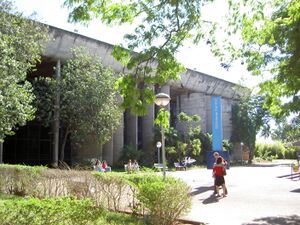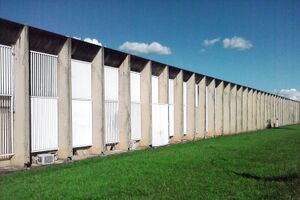Difference between revisions of "University of Brasília"
(Added: type, website.) |
(unstub) |
||
| (One intermediate revision by one other user not shown) | |||
| Line 1: | Line 1: | ||
{{group | {{group | ||
|wikipedia=https://en.wikipedia.org/wiki/University_of_Bras%C3%ADlia | |wikipedia=https://en.wikipedia.org/wiki/University_of_Bras%C3%ADlia | ||
| − | |||
|constitutes=university | |constitutes=university | ||
| − | | | + | |start=1962 |
| − | | | + | |description=Since 1962 UnB has played an important role both nationally and regionally in terms of teaching and research excellence |
| − | |headquarters= | + | |logo=Logo UnB (sem texto).png |
| + | |headquarters=Brasília,Brazil | ||
|type=Public university | |type=Public university | ||
|website=http://www.unb.br/ | |website=http://www.unb.br/ | ||
}} | }} | ||
| + | The '''University of Brasília''' ({{lang-pt|Universidade de Brasília}}, '''UnB''') is a [[federal government|federal]] [[public university]] in [[Brasília]], the capital of Brazil. It was founded in 1960 and has since consistently been named among the top five Brazilian universities and the top twenty universities in South America by [[Times Higher Education]] (THE). | ||
| + | |||
| + | It admits undergraduate and post-graduate students via an yearly entrance exam, known in Brazil as vestibular, and through [[ENEM]] and is most renowned for its courses in economics, [[international affairs]], law, [[anthropology]], mathematics and [[political science]]. Its Central Library is home to [[Central-West Region, Brazil|Midwestern]] Brazil's largest archive. | ||
| + | |||
| + | UnB offers 114 courses recognized by the [[Brazilian Ministry of Education|Ministry of Education]].<ref>http://www.seruniversitario.com.br|title=Faculdades reconhecidas pelo MEC, Vestibular, Apostilas, Universitário, Profissão, professor</ref> | ||
| + | |||
| + | ==History== | ||
| + | [[File:UNB.BR.JPG|thumb|left|University of Brasília library]] | ||
| + | [[File:ICC UnB.jpg|thumb|right|Central Institute of Sciences – ICC ("Minhocão")]] | ||
| + | The University of Brasilia Foundation was founded on December 15, 1961. Professor [[Darcy Ribeiro]], who became its first leader, was one of the most enthusiastic supporters of its creation. Architect [[Oscar Niemeyer]] designed its main building, the 700 m long ''Instituto Central de Ciências'' (ICC), nicknamed ''Minhocão''. | ||
| + | |||
| + | The institution was created on April 21, 1962 by educator [[Anísio Teixeira]] and [[anthropology|anthropologist]] professor [[Darcy Ribeiro]]. As of 2010, it employed 1,757 faculty and 2,391 servants, and had over 30,000 [[Postgraduate education|graduate]] and undergraduate students. Each semester, the University of Brasília accepts nearly 2,000 incoming students for its 61 undergraduate programs. On the graduate level, the university offers 49 [[master's degrees]] and 27 [[doctoral]] programs. | ||
| + | |||
| + | ==Academics== | ||
| + | The university was one of the first in Brazil to admit students via Programa de Avaliação Seriada (PAS), an alternative evaluation which tests high school students once a year bypassing [[vestibular]]. | ||
| + | |||
| + | Each semester, the University of Brasília accepts nearly 2,000 incoming students from a pool of approximately 25,000 candidates for its 61 daytime or evening undergraduate programs. At the graduate level, the university offers 56 [[Master's degree|masters]] programs and 31 doctorate programs. It also offers advanced non-degree programs, many of them conducted in other Brazilian States, such as [[Bahia]], Amazonas, Rondônia, [[Goiás]] and [[Rio Grande do Norte]]. The Technological and Scientific Development National Council (CNPq) and the Coordination for the Improvement of Higher Education Personnel (CAPES) support most of these courses, offering scholarships and research grants. | ||
| + | |||
| + | Distance education is an expanding activity in UnB, being managed by the Center for Open, Continuous and Long Distance Education (CEAD) and the School of Education. The United Nations Educational, Social and Cultural Organization (UNESCO) sponsors the Long Distance Education chair at UnB.<ref >http://www.unb.br|title=UnB – Universidade de Brasília</ref> | ||
| + | |||
| + | ==Ranking== | ||
| + | Several of University of Brasília's [[Postgraduate education|graduate]] programs have been graded 6 and 7 (in a scale from 1 to 7) in the annual [[Coordenadoria de Aperfeiçoamento de Pessoal de Nível Superior|CAPES]] assessment, including its courses in [[anthropology]], mathematics, geology, economics, law, among others. Its programs in economics, [[international relations]] and [[political science]] are ranked first among public universities in the country. | ||
| + | |||
| + | The University of Brasilia has been ranked one of the top five public universities in Brazil by [[Editora Abril]]'s ''Guia do Estudante''. It ranks eighth in the list of the best universities in the country.<ref name="rank">http://guiadoestudante.abril.com.br/|title=Guia do Estudante</ref> | ||
| + | |||
| + | |||
| + | |||
{{SMWDocs}} | {{SMWDocs}} | ||
==References== | ==References== | ||
{{reflist}} | {{reflist}} | ||
| − | |||
Latest revision as of 22:42, 30 January 2021
(University) | |
|---|---|
 | |
| Formation | 1962 |
| Headquarters | Brasília, Brazil |
| Type | |
| Since 1962 UnB has played an important role both nationally and regionally in terms of teaching and research excellence | |
The University of Brasília (Template:Lang-pt, UnB) is a federal public university in Brasília, the capital of Brazil. It was founded in 1960 and has since consistently been named among the top five Brazilian universities and the top twenty universities in South America by Times Higher Education (THE).
It admits undergraduate and post-graduate students via an yearly entrance exam, known in Brazil as vestibular, and through ENEM and is most renowned for its courses in economics, international affairs, law, anthropology, mathematics and political science. Its Central Library is home to Midwestern Brazil's largest archive.
UnB offers 114 courses recognized by the Ministry of Education.[1]
History
The University of Brasilia Foundation was founded on December 15, 1961. Professor Darcy Ribeiro, who became its first leader, was one of the most enthusiastic supporters of its creation. Architect Oscar Niemeyer designed its main building, the 700 m long Instituto Central de Ciências (ICC), nicknamed Minhocão.
The institution was created on April 21, 1962 by educator Anísio Teixeira and anthropologist professor Darcy Ribeiro. As of 2010, it employed 1,757 faculty and 2,391 servants, and had over 30,000 graduate and undergraduate students. Each semester, the University of Brasília accepts nearly 2,000 incoming students for its 61 undergraduate programs. On the graduate level, the university offers 49 master's degrees and 27 doctoral programs.
Academics
The university was one of the first in Brazil to admit students via Programa de Avaliação Seriada (PAS), an alternative evaluation which tests high school students once a year bypassing vestibular.
Each semester, the University of Brasília accepts nearly 2,000 incoming students from a pool of approximately 25,000 candidates for its 61 daytime or evening undergraduate programs. At the graduate level, the university offers 56 masters programs and 31 doctorate programs. It also offers advanced non-degree programs, many of them conducted in other Brazilian States, such as Bahia, Amazonas, Rondônia, Goiás and Rio Grande do Norte. The Technological and Scientific Development National Council (CNPq) and the Coordination for the Improvement of Higher Education Personnel (CAPES) support most of these courses, offering scholarships and research grants.
Distance education is an expanding activity in UnB, being managed by the Center for Open, Continuous and Long Distance Education (CEAD) and the School of Education. The United Nations Educational, Social and Cultural Organization (UNESCO) sponsors the Long Distance Education chair at UnB.[2]
Ranking
Several of University of Brasília's graduate programs have been graded 6 and 7 (in a scale from 1 to 7) in the annual CAPES assessment, including its courses in anthropology, mathematics, geology, economics, law, among others. Its programs in economics, international relations and political science are ranked first among public universities in the country.
The University of Brasilia has been ranked one of the top five public universities in Brazil by Editora Abril's Guia do Estudante. It ranks eighth in the list of the best universities in the country.[3]
An Alumnus on Wikispooks
| Person | Born | Summary | Description |
|---|---|---|---|
| Roberto Azevêdo | 3 October 1957 | Deep state functionary | WTO Director-General 2013-2020 |
References
- ↑ http://www.seruniversitario.com.br%7Ctitle=Faculdades reconhecidas pelo MEC, Vestibular, Apostilas, Universitário, Profissão, professor
- ↑ http://www.unb.br%7Ctitle=UnB – Universidade de Brasília
- ↑ http://guiadoestudante.abril.com.br/%7Ctitle=Guia do Estudante

